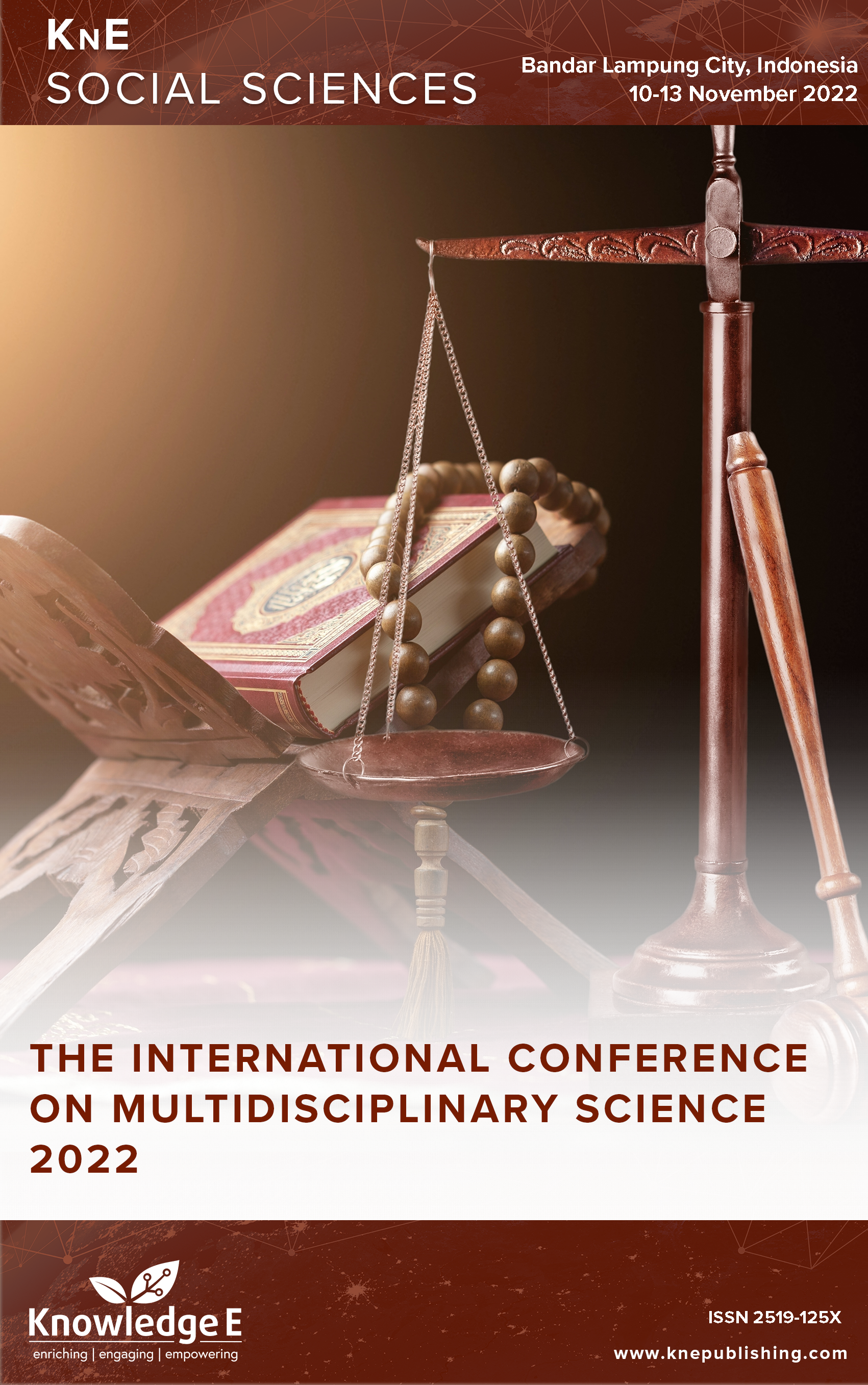Social Status and the Behavior of Palm Farmers in Community Life
DOI:
https://doi.org/10.18502/kss.v8i16.14065Abstract
Social status is a level or the position of a person in a society as derived from the level of education, level of employment, level of income and wealth and expenses. Social status is often directly proportional to the behavior of rice farmers. For instance, The spread of agricultural innovations in the countryside depends on the nature of the innovation and the type of societal decision-making. If individual innovation decision-making is more dominant, the positive relationship between social status and the rice field farmer’s behavior is acceptable, but if collective decision-making is more dominant, the spread of innovation depends on the suitability of the rice field farmer’s innovations for village communities. This study aims to look at the determinants of social status and observe the relationship between social status and the behavior of rice farmers in their social liveslife in Taman Fajar Village, Purbolinggo District, East Lampung Regency. This study used a qualitative research method with a descriptive approach. The population were rice farmers in this area. Data collection was done using observation, interviews, and documentation techniques. The results of this study indicate that there is a significant influence on the social status and behavior of rice farmers in society. This means that the higher the yields the rice farmers obtain, the more positive impact they can have on society, one of which is giving alms to people in need.
Keywords: Social Status, Peasant Behavior, Community.
References
[2] Andsberger, Henry, and Alexandrov, Pergolakan Petani Dan Perubahan Sosial ( Jakarta: CV. Rajawali). 1984.
[3] Arifa RN. Upaya Petani Sawah Dalam Meningkatkan Status Sosial Keluarga Di Desa Bernah Dalam Kabupaten Lampung Utara. UIN Raden Intan Lampung; 2019.
[4] Arikunto, and Suharsimi, Prosedur Penelitian: Suatu Pendekatan Praktek. Jakarta: Rineka Cipta; 2009.
[5] Azwar S. Metode Penelitian. Yogyakarta: Pustaka Pelajar; 1998.
[6] Basrowi, Juariyah. Analisis Kondisi Sosial Ekonomi Dan Tingkat Pendidikan Masyarakat Desa Srigading, Kecamatan Labuhan Maringgai, Kabupaten Lampung Timur, Jurnal Ekonomi Dan Pendidikan. 2010;7.1:58–81.
[7] Field J. Modal Sosial. Jakarta: Kreasi Wacana; 2011.
[8] Hadi S. Metodologi Research I. Yogyakarta: Fak. Psikologi UGM; 1985.
[9] Indrawati ES. Status Sosial Ekonomi Dan Intensitas Komunikasi Keluarga Pada Ibu Ruma Tangga Di Panggung Kidul Semarang Utara. Jurnal Psikologi Undip. 2015;14(1):52–7.
[10] Kartasapoetra AG. Teknologi Penyuluhan Pertanian. Jakarta: Bumi Aksara; 1991.
[11] Kemala N, Alawiyah W. Kaitan Aspek Status Sosial Petani Sayur Terhadap Jenis Sumber Informasi Yang Dimanfaatkan Di Kelurahan Lingkar Selatan Kecamatan Jambi Selatan Kota Jambi. Jurnal Media Agribisnis. 2016;1(1):39–52.
[12] Mahmud, Metode Penelitian Pendidikan. Bandung: CV Pustaka Setia; 2011.
[13] Malian I. Peran Kelompok Tani Dalam Peningkatan Status Sosial Ekonomi Petani Padi Sawah [ JOMB]. Journal of Management and Bussines. 2022;4(1):435–45.
[14] Nasirudin M, Sumekar, Dalmiyatun. Pengaruh Faktor Sosial Ekonomi Terhadap Perilaku Petani Dalam Usahatani Padi Di Desa Sumber Kulon Kecamatan Jatitujuh Kabupaten Majalengka. 2019.
[15] Pangarsa A. Memperkenalkan Kelompok Tani Sebagai Media Belajar Unit Produksi Dan Lembaga Ekonomi. Bogor: Pusdiklat IPB; 2006.
[16] Priyono E. Status Sosial Dan Perilaku Petani Dalam Penyuluhan Pertanian (Studi Kasus Di Desa Rende, Kecamatan Cikalong Wetan, Kabupaten Bandung). (IPB (Bogor Agricultural University)). 1990.
[17] Ramainas, and Ammon Pasaribu, ‘Perilaku Masyarakat Petani Terhadap Penumbuhan Kelompok Tani Di Kecamatan Sorkam Barat’. Akstensia. 2013;9(2):37–46.
[18] Santrock JW. Perkembangan Anak. 11th ed. Jakarta: Erlangga; 2007.
[19] Slamet M. Beberapa Catatan Tentang Pengembangan Organisasi Kumpulan Bahan Bacaan Penyuluh Pertanian. Bogor: Institut Pertanian Bogor; 2002.
[20] Soewadji J. Pengantar Metodologi Penelitian. Jakarta: Mitra Wacanna Media; 2012.
[21] Sumardi M. Sumber Pendapatan Kebutuhan Pokok Dan Prilaku Menyimpang. Jakarta: Rajawali; 2009.
[22] Syahyuti S. Kebijakan Pengembangan Gabungan Kelompok Tani Sebagai Kelembagaan Ekonomi Di Pedesaan. Jakarta: Kementerian Pertanian Indonesia; 2007.

